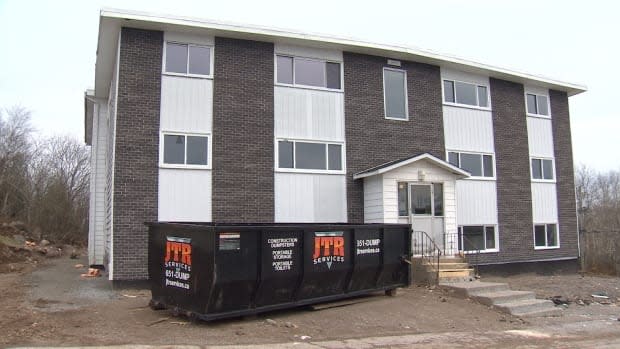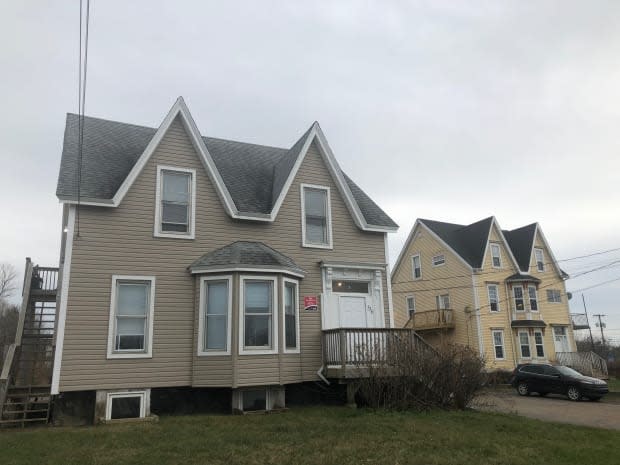'What are parents going to do?': N.B. renters face eviction despite COVID-19 surge
Ownership changes in New Brunswick apartment complexes that in some cases have been generating eviction notices for tenants in entire buildings is causing anxiety among those displaced.
It has led to calls for the province to delay the practice, at least while COVID-19 is surging.
"We're in the orange zone now," said Tara Cripps, who was told last week by National Bank she, her partner and their five children were being put out of their Saint John home of seven years.
"We can't even say, 'Hey, can we stay at your house?' We're supposed to be all in one family bubble thing again."
She said she's going to need friends to help her pack up.
"And I'm going to need their trucks and their cars and stuff to move. Is somebody going to call the police and be, like, 'There's multiple people going in and out of this house?'"
National Bank recently foreclosed on the Saint John apartment building owned by Cripps's landlord and, on Nov. 12, sent a lawyer's letter to her and her partner ordering them and their children to get out two weeks after Christmas.

"National Bank requires immediate vacant possession of the above noted property," read the notice from its Fredericton lawyer, Paul White. "On behalf of our client we hereby demand vacant possession on or before Wednesday January 6, 2021.
"Should you not vacate … it will be necessary for us to make court application to have you evicted and we will be asking for costs on behalf of [National Bank]."
"I've been here seven years and I've never been late on my rent," said Cripps.
"I've come to the understanding I need to find a new home. OK. But wait until it's a safer time. Wait until we're not in the orange zone. Wait until it's a little bit warmer. I'm hoping someone at the bank has a heart."
The eviction of tenants unable to pay rent was halted by the Higgs government in the early days of the pandemic in March but those restrictions were lifted June 1.

Since then, a new type of eviction has emerged as large numbers of New Brunswick apartment buildings have changed hands with some of the new owners wanting current tenants out.
Ron Blache-Fraser, a local property manager, said out-of-province investors have taken an interest in New Brunswick income properties as attractive real estate investment opportunities.
"There's a lot of interest from out-of-town buyers for all sorts of buildings in Saint John because the prices are lower, the returns are better," he said. "It's pretty straightforward."
In October, two five-unit buildings on Sherbrooke Street in Saint John were purchased by a group of Vancouver-area investors who paid $470,000 for the properties — 35 per cent above their assessed value.
The group then issued eviction notices to tenants in one of the buildings so renovations can be done and rents increased.

Blache-Fraser is managing those buildings and said they were in poor condition and needed significant work. He expects rents, which were between $475 and $650 per month prior to the purchase, will climb to $975 for a two-bedroom unit once renovations are complete.
"We issued notice that we would be doing major renovations and gave tenants three-months notice, which we did not have to do," said Blache-Fraser.
"They need to be out at the end of January. Some are already leaving and we're in the process of renovating because the buildings are in deteriorated condition."
Across the city on Jack Street, an Ontario company bought a pair of 24-unit buildings. In September, it issued eviction notices to tenants in one of the buildings to be out by Nov. 30.
That deadline is next week. Although most tenants have gone elsewhere, at least one woman remains.

Dave Cormier is her son.
He said she has been in the building for 10 years. He said finding a two-bedroom unit for her for the $750 per month she currently pays has been difficult with vacancy rates falling and rents increasing all over Saint John.
"It's almost impossible unless you've got $1,400, or $1,600 or $2,000 [for rent]," he said.
"Even $1,100 for a two-bedroom apartment is a lot of money for low-income [people]."
Cormier has been speaking with the province about public housing and is hopeful something is happening, but with the eviction deadline just a week away and COVID-19 suddenly spiking in the community, it has been a stressful experience.
"It's scary. You know, COVID-19 is not making this any easier at all. It might be a little bit easier if that wasn't going on, but it is. And because of that, things are difficult."
Last week, a surge in COVID-19 infections across southern New Brunswick caused the province to downgrade communities from Sackville to St. Stephen, including Moncton and Saint John, from the yellow phase to the orange phase of pandemic recovery. That requires the public to limit contacts with people outside of their household bubble.

Premier Blaine Higgs was asked Friday if there are any additional protections for tenants in orange-phase areas who are being put out of their buildings. His answer was no.
"No, not at all," said Higgs. "Not at this time."
That causes worry for tenants like Cripps. Her landlord owns multiple buildings and she said the letter carrier who delivered her eviction notice told her he had several others to hand out.
A spokesperson for National Bank said it was not involved in other evictions and has already contacted Cripps about allowing her family to stay where it is.
"Other cases were with other lenders," said Jean-Francois Cadieux. "Our legal external counsel has contacted the tenants. He presented them solutions and informed them that we will not be asking that they vacate their apartment."
'Kids can't sleep in a car'
But Cripps said the bank's solution involves her making an offer to buy the building. She said she doesn't have a down payment and doubts she could afford the building.
She does not want to uproot her children before Christmas but is worried about what comes after, especially if large numbers of other evicted renters are suddenly in the market at the same time looking for a place to live.
"There are good tenants that are being penalized and now they're being put out," she said.
"All these families now need to find a home. We're all going to be fighting for an apartment. There are going to be people who are probably going to end up homeless. What are parents going to do? Kids can't sleep in a car."


